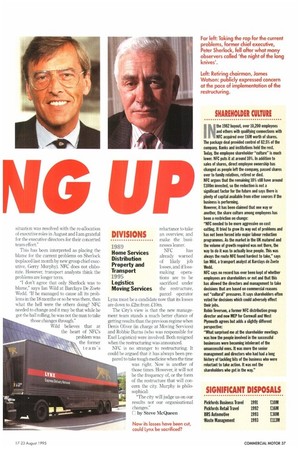SHAREHOLDER CULTURE
Page 39

If you've noticed an error in this article please click here to report it so we can fix it.
_ the 19g2 buyout, over 10,200 employees
and others with qualifying connections with
._._ NEC acquired over £6114 worth of shares. The package deal provided control of 82.5V, of the company. Banks and institutions held the rest. Today, the employee shareholder "culture" is much lower. NEC puts it at around 10'fc. In addition to sales of shares, direct employee ownership has changed as people left the company, passed shares over to family relatives, retired or died.
NEC argues that the remaining 10)4 still have around £100m invested, so the reduction is not a significant factor for the future and says there is plenty of capital available from other sources if the business is performing.
However, it has been claimed that one way or another, the share culture among employees has been a restriction on change:
"NEC needed to be more aggressive on cost cutting. It tried to grow its way out of problems and has not been forced into major labour reduction programmes. As the market in the UK matured and the volume of growth required was not there, the way to do it was to actually lose people. This was always the route NEC found hardest to take," says Ian Wild, a transport analyst at Barclays de Zoete Werth.
NEC says no record has ever been kept of whether employees are shareholders or not and that this has allowed the directors and management to take decisions that are based on commercial reasons not "cultural" pressures. It says shareholders often voted for decisions which could adversely effect their jobs.
Robin Teverson, a former NEC distribution group director and now MEP for Cornwall and West Plymouth agrees but adds a slightly different perspective: "What surprised me at The shareholder meetings was how the people involved in the successful businesses were becoming intolerant of the unsuccessful ones. It was more the senior management and directors who had had a long history of tackling bits of the business who were reluctant to take action. It was not the shareholders who got in the way."
























































































